Neil Barofsky, special inspector general for the Troubled Asset Relief Program (TARP) testifies during a House Oversight and Governmental Reform Committee hearing on AIG bonuses in Washington on October 14, 2009. UPI/Kevin Dietsch |
License Photo
WASHINGTON, Feb. 14 (UPI) -- The head of the watchdog agency overseeing the U.S. government's bailout programs says he will resign next month.
Neil Barofsky, the U.S. Treasury's watchdog overseeing the government's bailout program, said Monday he will resign effective March 30.
In his letter to President Obama, Barofsky said that his special inspector general office's oversight helped the Troubled Asset Relief Program exceed expectations in terms of its costs, The Hill reported.
"Thanks in no small part to the dedication of the talented professionals at SIGTARP, TARP stands in a far better and more transparent place today than anyone could have reasonably hoped in December 2008," Barofsky wrote. "The anticipated financial costs, while still significant, have fallen dramatically from early projections."
The non-partisan Congressional Budget Office said TARP is expected to cost the government just $25 billion, not the $700 billion-plus as originally planned.
House Oversight Committee Chairman Darrell Issa, R-Calif., thanked Barofsky for his "extraordinary commitment to public service."
"The passage of TARP signaled a pivotal moment at a time of great uncertainty and no one has been more dedicated to protecting the American people's tax-dollars from waste, fraud and abuse than Neil Barofsky," Issa said.
The office's investigations led to 14 convictions for fraud, more than $550 million in prevented fraud losses, and more than $150 million recovered, The Hill said. More than 140 investigations still are active.















